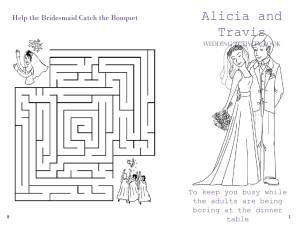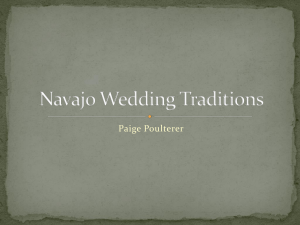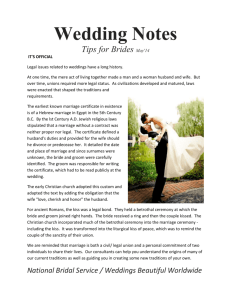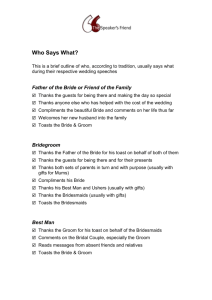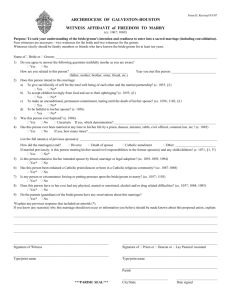Short story about marital ceremony of Berta people
advertisement
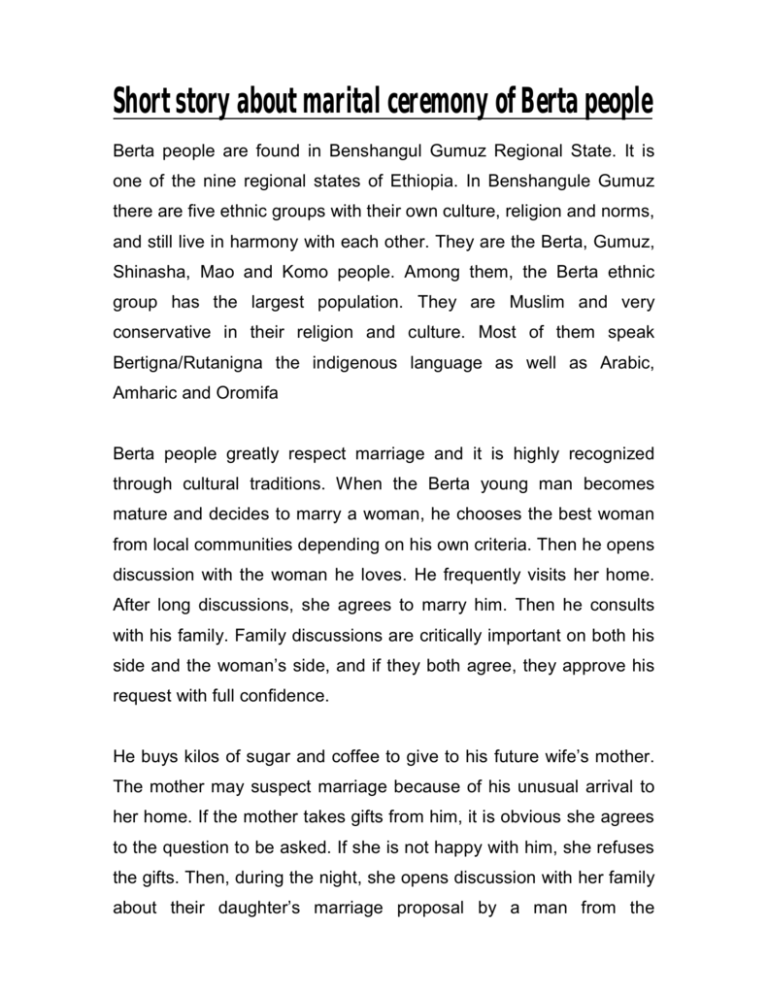
Short story about marital ceremony of Berta people Berta people are found in Benshangul Gumuz Regional State. It is one of the nine regional states of Ethiopia. In Benshangule Gumuz there are five ethnic groups with their own culture, religion and norms, and still live in harmony with each other. They are the Berta, Gumuz, Shinasha, Mao and Komo people. Among them, the Berta ethnic group has the largest population. They are Muslim and very conservative in their religion and culture. Most of them speak Bertigna/Rutanigna the indigenous language as well as Arabic, Amharic and Oromifa Berta people greatly respect marriage and it is highly recognized through cultural traditions. When the Berta young man becomes mature and decides to marry a woman, he chooses the best woman from local communities depending on his own criteria. Then he opens discussion with the woman he loves. He frequently visits her home. After long discussions, she agrees to marry him. Then he consults with his family. Family discussions are critically important on both his side and the woman’s side, and if they both agree, they approve his request with full confidence. He buys kilos of sugar and coffee to give to his future wife’s mother. The mother may suspect marriage because of his unusual arrival to her home. If the mother takes gifts from him, it is obvious she agrees to the question to be asked. If she is not happy with him, she refuses the gifts. Then, during the night, she opens discussion with her family about their daughter’s marriage proposal by a man from the community. She briefs them about him and his family, too. Then, they decide to give her for marriage. The young man selects two elders from the community and sends them to the girl’s family. The two elders go to the woman’s family and say “Give your daughter to our son for marriage.” The family asks who the man is. The elders give full information about the man who will marry their daughter. If the family believes the elders and agrees to their request, they invite elders to sit and have coffee. If they disagree, they do not invite the elders for coffee. During coffee invitation they schedule an appointment to make the final decision for a wedding date. In the next meeting, the families will decide the wedding date and declare they are to be married. The woman’s family gives land to the young man to construct a house near their home in their home compound. This is very unique culture in Berta ethnic group. The newly wed husband and wife live there for at least one year, or until they have their first baby. Then he may leave the family compound and construct his own permanent house at his father’s compound. The main reason why he builds his first house in his father-in-law’s compound is so they can give care for their daughter while she gives birth. As soon as the house is constructed, the marriage process continues. The young man gives the bride price 2000-5000 Eth. Birr to his father-in-law to prepare the wedding ceremony, and he gives a rolled cloth 30-40 meters long to his mother-in-law. This cloth is used to dress the new born child, or used to cover the body when someone from the family dies. In the wedding ceremony, the role of women is very significant. During the wedding day, the bride waits for the groom in the newly constructed house with her bridesmaids while the groom sits on the back of a donkey with his friends, dancing and blowing traditional instruments called Agu Awazu (in Bertigna language). They are thee types of instruments: Wazalu is short and makes a top/high sound, Awaza gunde is medium and makes medium sounds and Awaza shinir is big and used for distant sound. Once he arrives and enters the newly constructed house to meet his bride, all of the invited people will return to their home, and the festival is over. Until seven days the bride and groom are not to leave the house. The mother-inlaw is responsible to feed and care for them. At seventh day, the bride and groom kill a sheep or goat and then go to his family’s home to get some advice. The married couple receives full support from woman’s family at least for one year. The bride after married will not go elsewhere even to the market for any business up to the minimum for one year. The following pictures were taken during the marriage ceremony undertaken between Mr. Alami Jimaa & Ms. Mekesiya Salid on 25 March, 2010 at Abramoo community, 15 Km to West of Assosa Town. The bride with her bridesmaids waiting for the groom in the newly constructed house at father-in-law’s compound On the wedding occasion, women carrying all necessary materials for bride and groom and going to the newly built house with traditional dancing During the wedding occasion people accompany the groom playing traditional instruments [give the names also here for the different sizes] The groom joyfully sitting on the back of donkey and coming to the newly constructed house where the bride is waiting for him. May 20 2010 :Cultural Biodiversity Project Officer http://www.isd.org.et
